Product pictures
| Amount Per 0.25 package, 241 g | |||
| Calories | 590 Kcal (2470 kJ) | ||
| Calories from fat | 99 Kcal | ||
| % Daily Value* | |||
| Total Fat | 11g | 17% | |
|---|---|---|---|
| Saturated Fat | 2g | 10% | |
| Cholesterol | 45mg | 15% | |
| Sodium | 1260mg | 53% | |
| Potassium | 250mg | 5% | |
| Total Carbs | 99g | 33% | |
| Sugars | 18g | 72% | |
| Dietary Fiber | 2g | 8% | |
| Protein | 22g | 44% | |
| Vitamin C | 22.5mg | 38% | |
| Vitamin A | 0.1mg | 2% | |
| Iron | 4.5mg | 25% | |
| Calcium | 40mg | 4% | |
* Percent Daily Values are based on a 2000 calorie diet. Your daily values may be higher or lower depending on your calorie needs.
Find out how many calories should you eat.
Ingredients And Nutrition Overview
Best
choice Good
choice Poor
choice Avoid
it!
choice Good
choice Poor
choice Avoid
it!
-
WeightWatchers Points: 12.3, PointsPlus: 15, SmartPoints: 18
WeightWatchers Points are estimated by carbohydrates, fats, protein and fiber in product. They are not an affirmation of better quality or nutritional value of the product or its manufacturer. Only way to count for dieters. Less points are better.
Read more at Weight watchers diet review -
Keep an eye on the cholesterol.
Today cholesterol is no longer a villain. The 2010's USDA guidelines told us to limit cholesterol from foods
Now experts say cholesterol is "not a nutrient of concern" because cholesterol from foods doesn't cause higher blood cholesterol levels.
Nevertheless try to consume no more than 300 milligrams daily.
This product contains more than 15% of your daily cholesterol intake.
If you still are on a low cholesterol diet, please keep in mind:
- nutritionists are not recommending you go out and binge on cheeseburgers and fries.
- 10% of your daily allowance can quickly become 50% when a hamburger turns into double cheeseburger.
-
Want to lower the cholesterol intake? Here are some advices:
- Try to limit your cheese, dairy and meat intake to one item per meal.
- Avoid meals with multiple sources of cholesterol (chicken with cheese, junk food)
- Try to indclude in your diet low- or nonfat dairy, seafood, legumes and nuts.
- Choose water instead of milk for your coffee.
-
Oh dear! Very salty! Over 50% of daily sodium allowance
The average American consumes 5,000 mg of sodium daily — twice the recommended amount amount of 2400mg for healthy adults, this is 1 teaspoon of salt.
For medical reasons many people should not exceed 1500mg of sodium.
Surprisingly, you're responsible for only 15% of the sodium in your diet the bigger part - 75% of the sodium that you consume each day comes from processed foods, not home cooking or the salt shaker.
Excess sodium intake increases the risk of high blood pressure, hypernatremia, hypertension, cardiovascular disease and other heart problems.
Are these reasons enough to cut the sodium intake? No doubt! -
Convert Salt tsps to Sodium mg easily
Salt (NaCl) is not excactly sodium (Na).
It is not right to use these terms as synonyms.
The FDA recommended limit of sodium is 2,300 mg per day (or even less - about 1500 mg while one is on low sodium diets).
This is much less than the weight of salt.
(5,750 mg per day or 3,750 mg for low sodium diet) and not so convenient to calculate.
Know how much sodium is in your salt - without a calculator:
1/4 tsp salt = 600 mg sodium
1/2 tsp salt = 1200 mg sodium
3/4 tsp salt = 1800 mg sodium
1 tsp salt = 2300 mg sodium -
7 tsp of sugars per serving
This volume includes both naturally occurring from ingredients and specially added sugars.
USDA tells us that last years each American consumed an average 130 pounds of caloric sweeteners per year!
That works out to 30 tsp of sugars per day approximately 480 extra calories!
Just to think: Eating just 200 more calories daily than your body requires for body functioning and exercise leads to a 20-pound weight gain in a year. -
More than 8% daily fiber!
Eat more fiber. You've heard it many times. But why it is so good for your health?
Dietary fiber is best known for its ability to make our digestion going right.
So want to prevent or relieve constipation - eat more fiber!
There are also other great health benefits as well, such as lowering your risk of diabetes, heart disease and cancer, and helping to maintain a healthy weight by helping to feel you full longer.
The best source of fiber are fruits, vegetables, whole grains and legumes and not processed foods with added fiber. -
Naturally high in Vitamin C
You get real, natural easy absorbing Vitamin C from this product, not as a artificial fortified ingredient.
This is great! Let's try to get the best from the real food, because we get too much from artificial ingredients nowdays. -
A very good natural source of Iron
You get real, natural easy absorbing Iron from this product, not as an artificial fortified ingredient.
This is great! Let's try to get the best from the real food, because we get too much from artificial ingredients nowdays. -
Whoa! What a high amount of calories!
This product really has a lot of calories.
Energy(calories) is required to implement body metabolism and physical activity.
If we consume more energy than we use for metabolism and physical activity, all that surfeit will be stored as body fat.
So you're not following a high calorie diet or not trying to gain weight, you may want to revise the wish to eat it.
If You are trying to gain weight or following high calorie diet try out the healthy suggestions:
- Consume more nuts.
Nuts and seeds are high in calories and fiber and full of good Omega fats.
Take any meal and add to it some nuts.
- add extra olive oil to your main dishes and salads;
- increase your healthy carbohydrate intake with whole wheat products such as pasta, crackers an so on;
- eat more brown or wild rice, buckwheat and other grains;
- Even eat some dark chocolate.
Avoid using animal fats, fried foods and greasy snacks as they have huge amount of trans-fats, cholesterol and other unhealthy elements. -
Contains MSG-like ingredients
People feeling reaction to MSG may also react adversely to MSG-like substances.
Glutamates or chemically similar items are added to improve a product's taste.
Here is a short list of common MSG-like substances:
- Yeast extract
- Autolyzed yeast
- Hydrolyzed proteins
- Textured proteins
- Anything "enzyme modified"
Allergens
Gluten Allergy, Wheat Allergy, Lactose Allergy, Milk Allergy, Soy Allergy, Sesame Allergy, Corn Allergy
Orange chicken Ingredients
Breaded Chicken Breast Chunks: Chicken Breast with Rib Meat, Water, 2% or Less of: Chicken Broth, Sodium Phosphate, Salt, Modified Food Starch, Battered and Breaded with: Wheat Flour, Water, Bleached Wheat Flour, 2% or Less of: Rice Starch, Salt, Dried Buttermilk, Dextrose, Sodium Aluminum Phosphate, Sodium Bicarbonate, Spices, Xanthan Gum, Extractives of Paprika and Annatto, Dried Garlic, Soybean Oil, Mono-Diglycerides, Wheat Starch, Sugar, Yeast. Breading Set in Vegetable Oil. Orange Sauce: Water, Brown Sugar, Soy Sauce (Water, Wheat, Soybeans, Salt), Orange Juice Concentrate, Modified Cornstarch, Ginger, Onion Powder, Orange Peel, Toasted Sesame Oil, Rice Vinegar, Autolyzed Yeast Extract, Dehydrated Garlic, Spices, Flavor. Rice: Enriched Long Grain Rice, Iron (Ferric Orthophosphate), Niacin, Thiamin (Thiamin Mononitrate), Folic Acid.
You Might Also Like
% RDI of Main Nutrition Facts
30%
of RDI* (590 calories) 241 g
-
Cal: 29.5 %
-
Fat: 16.9 %
-
Carb: 33 %
-
Prot: 44 %
-
0%25%75%RDI norm*
Calories Breakdown
- Carbs (67.9%)
- Fat (17%)
- Protein (15.1%)
Get Your Recipe of Health!
Follow RecipeOfHealth on Facebook!

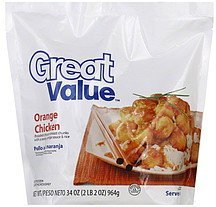
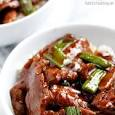
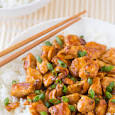
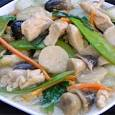
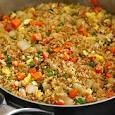
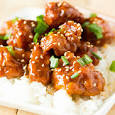
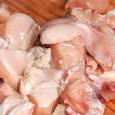
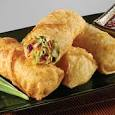
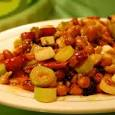
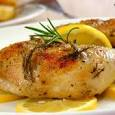
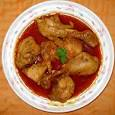
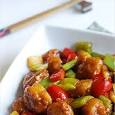
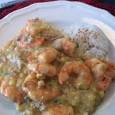
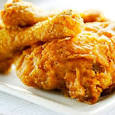
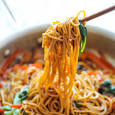
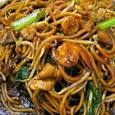
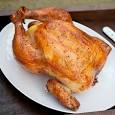
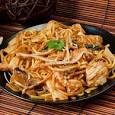
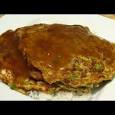
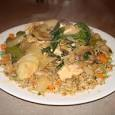
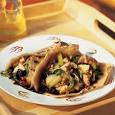

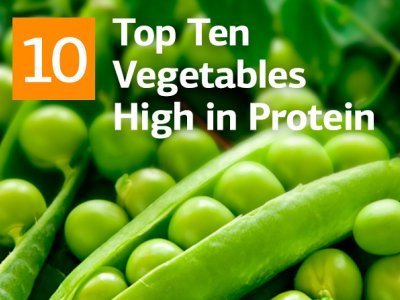

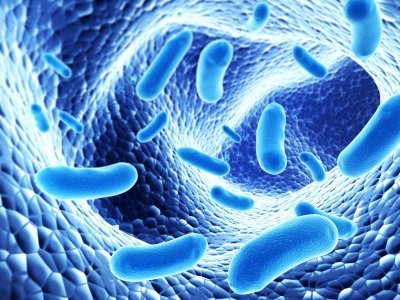










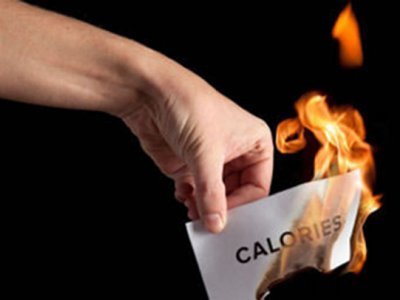
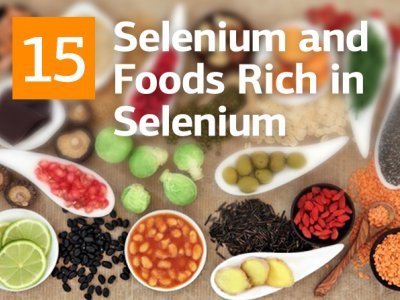
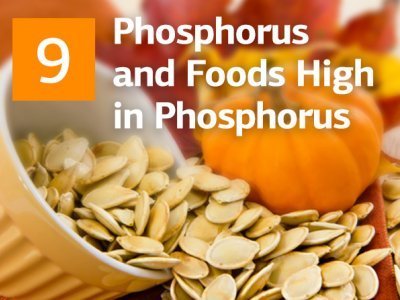
Add your comment